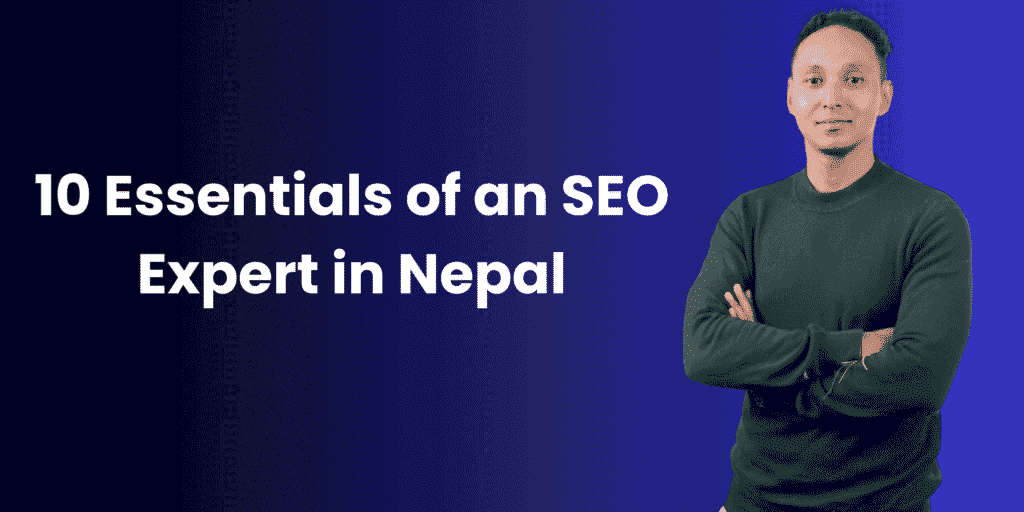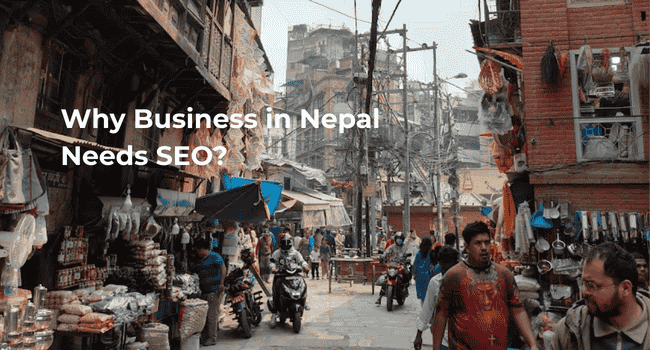In Nepal’s rapidly evolving digital landscape, the demand for SEO expertise is greater than ever. Businesses are looking to enhance their online visibility, and only a skilled SEO expert can help them achieve higher rankings and organic growth.
Here are the 10 essential qualities that every SEO expert in Nepal should possess:
Analytical Skills: The SEO Compass
At the core of every SEO strategy lies data—and the ability to interpret it accurately. Analytical skills are what separate amateurs from professionals. In the context of Nepal, where many businesses are still transitioning from traditional marketing to digital, an SEO expert must be skilled at understanding metrics such as bounce rate, user flow, click-through rate (CTR), keyword performance, and goal conversions. For example, a local college’s admissions landing page might receive traffic but no conversions.
A SEO expert gets into the users’ behavior using tools like Google Analytics, Hotjar, and Search Console to determine the areas of user experience issues. They might discover, for instance, that a form is too lengthy or that the call-to-action (CTA) does not grab attention. Armed with these results, the expert provides actionable guidance on how to enhance. These professionals conduct in-depth audits and typically uncover hidden patterns that can revolutionize both search rankings and user experience (UX). Their analytical competencies benefit clients across various industries, such as e-commerce and real estate, by allowing them to make data-driven SEO decisions that boost their revenue, not just their search result rankings.
Technical SEO
Technical SEO is the cornerstone of search visibility. It may not be exciting but it’s essential to have a good technical foundation for content performance to take effect. Its core pillars include crawling, indexing, mobile usability, structured data, site speed, canonicalization, HTTPS security, and XML sitemaps. The majority of Nepalese websites are not mobile optimized, their server response time is slow, and they have duplicate content issues, especially with multilingual versions, i.e., English and Nepali versions.
Using tools like Screaming Frog, GTmetrix, and PageSpeed Insights, it’s possible to tackle these problems in a systematic manner. For instance, optimizing Core Web Vitals and implementing hreflang tags enables search engines to differentiate between English and Nepali variants of web pages. Mastering these technical aspects ensures agility and adaptability to Google’s ever-evolving algorithmic updates.

Keyword Research Mastery
Keyword research in Nepal isn’t just about “volume”; it’s about intent, local context, and language diversity. With regional search terms like “best trekking agency in Pokhara” or “affordable IELTS classes in Kathmandu”, identifying the right mix of high-volume and long-tail keywords is crucial.
Researching keywords involves mapping them to buyer personas, aligning them with funnel stages, and optimizing them across meta tags, content, and anchor text. This strategic approach ensures the right people find your business at the right time.
Content Strategy and On-Page Optimization
A strong content strategy is the pillar of excellent SEO. Throwing keywords around isn’t about it—being capable to develop high-value, audience-targeted content that resonates with search intent is. An SEO expert ought to be able to craft great headlines, optimize meta tags, implement header hierarchy correctly, and incorporate internal linking techniques.
Thin content or keyword saturation are also prevalent problems in Nepal’s online commerce environment. A pro will, first of all, perform a content audit, identify content gaps, and optimize existing and new content for users and search engines. For instance, adding FAQs with schema markup, incorporating optimized images with ALT tags, and structuring content for featured snippets can significantly increase visibility. A travel blog on “best places to visit in Nepal during Dashain” can be improved by detailed itineraries, local tips, and maps, all well-structured with proper semantic tags and schema markup for rich results.
Technical Knowledge of Web Development Basics
An SEO expert doesn’t need to be a developer, but it is crucial to understand the basics of HTML, CSS, and JavaScript, as well as content management systems (CMS) like WordPress. This knowledge facilitates better communication with developers and allows for hands-on optimization. For example, an SEO expert should be able to add meta tags directly, resolve issues with the robots.txt file, and adjust canonical tags.s.
Knowing how to minimize render-blocking scripts or improve CLS (Cumulative Layout Shift) contributes to better Core Web Vitals scores. In Nepal, many small business websites are built on budget templates that lack optimization—an expert’s ability to intervene directly can be the difference between page one and page ten. A working knowledge of schema markup, lazy loading, image optimization, and CDN integration is crucial for real-world results.
Off-Page SEO and Link Building Strategy
Off-page SEO, especially link building, is a fundamental aspect of search engine ranking. A professional SEO expert should have proper knowledge of ethical and effective means of acquiring links. It involves earning backlinks through guest blogging, online PR, content partnerships, and submission in quality directories. Keeping the quality of links over quantity is greatly critical in today’s SEO techniques. For instance, obtaining a link from credible Nepalese news sites like OnlineKhabar or The Himalayan Times is far better than obtaining many links from splogs.
Moreover, experts should be able to perform a detailed backlink audit using tools like Ahrefs or SEMrush, identify toxic links, and disavow them to prevent penalties. A practical understanding of how anchor text diversity, domain authority, and link velocity influence rankings is crucial.
Communication and Client Education
A key trait of a successful SEO expert is the ability to explain complex SEO processes in a simple and actionable way. This includes clarifying how technical SEO functions and explaining why certain content needs to be updated. Clear communication helps build client trust and ensures everyone is aligned on the strategy.
For instance, when proposing a site restructuring to a Nepali e-commerce client, the expert should clearly explain how improved URL hierarchy and internal linking can directly impact conversions. Transparent reporting, using visual tools like Google Looker Studio or simple spreadsheets, helps clients track KPIs such as traffic growth, rankings, and conversions. An SEO expert must also regularly update clients about algorithm changes and their impact on performance.
Analytical Mindset and Data-Driven Decisions
An SEO expert must excel at interpreting data from tools like Google Analytics, Search Console, and third-party platforms (e.g., Ahrefs, SEMrush). This includes identifying trends in traffic, measuring keyword performance, understanding bounce rates, and calculating ROI. For instance, recognizing that a high bounce rate on mobile might indicate a UX or speed issue is crucial. SEO without data is guesswork—experts must base every recommendation on clear metrics.
Adaptability to Algorithm Changes
Search engine algorithms evolve constantly. An effective SEO expert not only keeps up with updates (like Google’s Helpful Content or Spam Updates) but also adjusts strategies accordingly. This means quickly responding to ranking drops, adapting content formats, or revisiting technical foundations. Agility is key to long-term SEO success in an ever-shifting digital environment.
Strategic Thinking and Cross-Department Collaboration
SEO isn’t isolated. A true expert works with content writers, developers, UX designers, and even sales teams to align SEO with broader business goals. Whether it’s structuring a blog to support PPC campaigns or enhancing product pages to reduce ad spend, strategy is essential. Collaborative SEO drives results beyond traffic—it drives business growth .
Conclusion
To Become an SEO expert is not easy. It involves more than technical skills to be a good SEO professional—there’s a need for strategic thinkers, adaptability, analytical skills, and great people skills. From understanding algorithms and keyword research to collaborating with cross-functional teams and staying current on industry trends, the work is dynamic and multidisciplinary.
The 10 key skills—ranging from technical skill and content strategy to data analysis and flexibility—are the foundation of sustainable SEO success. They not only cause improvement in search rankings but also align SEO activity with overall business goals, delivering tangible and quantifiable outcomes.



